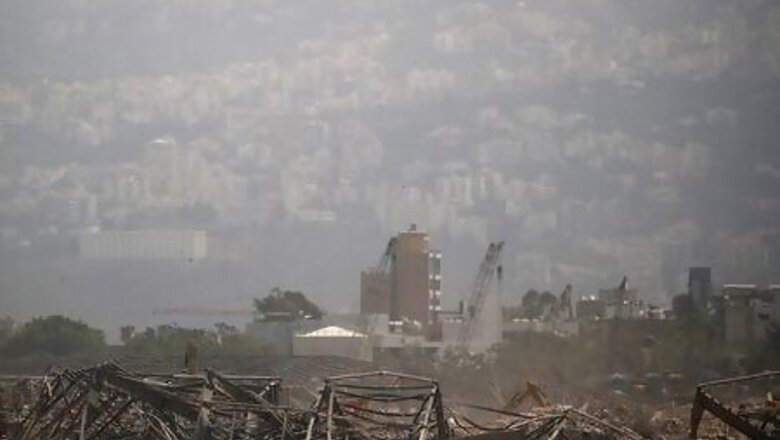
views
BEIRUT Lebanese riot police fired tear gas at demonstrators trying to break through a barrier to get to the parliament building in Beirut on Saturday and shots were heard as protests over this week’s devastating explosion grow.
Dozens of protesters broke into the foreign ministry where they burnt a framed portrait of President Michel Aoun, representative for many of a political class that has ruled Lebanon for decades and which they say is to blame for its deep political and economic crises.
“We are staying here. We call on the Lebanese people to occupy all the ministries,” a demonstrator said by megaphone.
Thousands gathered in Martyrs’ Square in the city centre, some throwing stones. Police fired tear gas when some protesters tried to break through the barrier blocking a street leading to parliament, a Reuters journalist said.
Police confirmed shots had been fired. It was not immediately clear by or at whom.
The protesters chanted “the people want the fall of the regime”, a popular chant during the Arab Spring uprisings of 2011, and “Revolution, Revolution”. They held posters saying “Leave, you are all killers”.
Soldiers in vehicles mounted with machine guns patrolled the area amid the clashes.
“Really the army is here? Are you here to shoot us? Join us and we can fight the government together,” a woman yelled.
Tuesday’s blast, the biggest in Beirut’s history, killed 158 people and wounded 6,000, the health ministry said. Twenty-one people were still reported as missing.
The government has promised to hold those responsible to account. But few Lebanese are convinced. Some set up nooses on wooden frames as a warning to Lebanese leaders.
“Resign or hang,” said a placard.
Riot police fired dozens of tear gas canisters at protesters who set a fire and hurled stones.
Some residents, struggling to clean up shattered homes, complained that the government they see as corrupt – there had been months of protests against its handling of a deep economic crisis before this week’s disaster – had let them down again.
“I wish the United Nations would take over Lebanon,” said university student Celine Dibo as she scrubbed blood off the walls of her shattered apartment building.
Several people said they were not surprised that French President Emmanuel Macron had visited this week while Lebanese leaders had not.
“We are living in ground zero. I hope another country would just take us over,” said psychologist Maryse Hayek, 48, whose parents’ house was destroyed in the explosion.
Kareem, an aid worker, said protesting was the only thing for the people to do.
“We helped people, we cleaned houses, we mourned and we cried a lot, a lot, a lot,” he said. “But today it’s the time to show them again that we’re here. This is why I’m here today.”
Lebanon’s Kataeb Party, a Christian group that opposes the government backed by the Iran-aligned Hezbollah, announced on Saturday the resignation of its three lawmakers from parliament.
“I invite all honourable (lawmakers) to resign so that the people can decide who will govern them, without anybody imposing anything to them,” said party chief Samy Gemayel.
Macron promised angry crowds that aid to rebuild Beirut would not fall into “corrupt hands”. He will host a donor conference for Lebanon via video-link on Sunday.
Macron told U.S. President Donald Trump that U.S. sanctions targeting Hezbollah are playing into the hands of those they are meant to weaken, an Elysee official said. The United States should “reinvest” in Lebanon to help rebuild it instead.
The Lebanese prime minister and presidency have said 2,750 tonnes of highly explosive ammonium nitrate, which is used in making fertilisers and bombs, had been stored for six years without safety measures at the port warehouse.
President Aoun said on Friday an investigation would examine whether the blast was caused by a bomb or other external interference, negligence or an accident. Twenty people had been detained so far, he added.
‘WE CAN’T AFFORD TO REBUILD’
Some residents wondered how they would ever rebuild their lives.
Tearing up, Bilal Hassan used his bare hands to try to remove debris from his home. When his three wounded teenage children ran for their lives they left blood stains on the staircase and walls.
“We can’t afford to rebuild and no one is helping us,” he said, standing beside a large teddy bear that was blown across his home, and a damaged photograph of him and his wife.
Bulldozers ploughed through the wreckage of mangled homes and long rows of flattened cars as soldiers stood by. Volunteers with shovels streamed through streets.
Officials have said the blast could have caused losses amounting to $15 billion. That is a bill that Lebanon cannot pay after already defaulting on a mountain of debt – exceeding 150% of economic output – and with talks stalled on a lifeline from the International Monetary Fund.
‘MINI ATOM BOMB’
France and other countries have rushed emergency aid to Lebanon, including doctors, and tons of health equipment and food. The blast destroyed Lebanon’s only major grain silo and U.N. agencies are helping provide food and medical aid.
For ordinary Lebanese, the scale of destruction is overwhelming.
“It felt like a mini atomic bomb,” said George Rohana, sitting beside a supermarket that was demolished.
Marita Abou Jawda was handing out bread and cheese to victims of the blast.
“Macron offered to help and our government has not done anything. It has always been like that,” she said. “After Macron visited I played the French national anthem all day in my car.”
(Additional reporting by Maher Chmaytelli, Laila Bassam, Suleiman Al-Khalidi, Ezgi Erkoyun, Ellen Francis and Richard Lough; Editing by Frances Kerry and Nick Macfie)
Disclaimer: This post has been auto-published from an agency feed without any modifications to the text and has not been reviewed by an editor












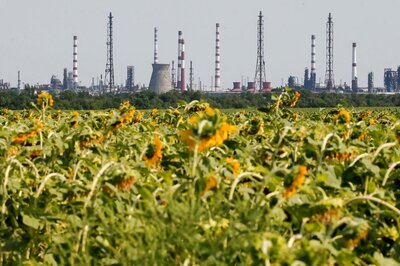



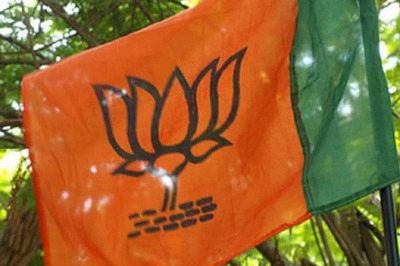
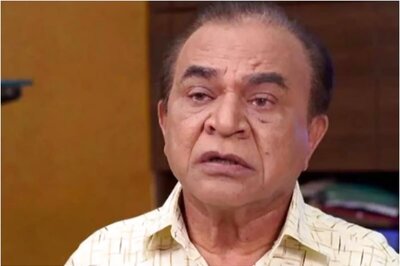

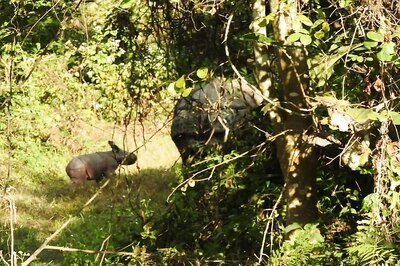
Comments
0 comment